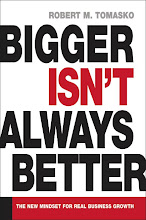December 13, 2005
Does synergy scale?
Steve Case said it well in an op-ed piece this weekend:
Case’s frank admission is echoed in an article in today’s Washington Post:
Mega-mergers, and companies built on high-concept, Napoleonic-style empire building fantasies seldom payoff. Synergy is a great idea. Unfortunately, it is one that doesn’t scale very well.
Although I played a key role in bringing AOL and Time Warner together six years ago, it's now my view that it would be best to "undo" the merger by splitting Time Warner into several independent companies and allowing AOL to set off on its own path. Here's why.
When the merger was announced, analysts believed that Time Warner's music, movies and magazines along with its cable systems would speed up AOL's transition from phone dial-up to broadband, and that AOL's Internet mentality would accelerate growth at Time Warner. Neither has occurred.
Case’s frank admission is echoed in an article in today’s Washington Post:
Hollywood is littered with broken dreams -- even if your name is Steven Spielberg.
The fantastically successful film director and his partners, Jeffrey Katzenberg and David Geffen -- no Hollywood slouches themselves -- conceived DreamWorks SKG Inc. in 1994 with the goal of creating a media empire.
Steven Spielberg, left, Jeffrey Katzenberg and David Geffen, right, built DreamWorks as a studio that would bridge movies, TV, music, video games and other media. Paramount Pictures agreed Sunday to buy DreamWorks.
The announcement Sunday that Paramount Pictures agreed to buy DreamWorks for $1.6 billion brought to a close the trio's original ambition to house a movie, television, music, animation, video game and Internet juggernaut under the one roof of an independent studio.
"They, like everyone else in Hollywood, mistakenly thought all these businesses were highly related and there would be all sorts of synergy -- and there was not," said Tom Adams, president and senior analyst at Adams Media Research, an entertainment industry research and consulting firm in Carmel, Calif.
For the past decade, the lofty aims of the DreamWorks team have been steadily pared back. The studio's Internet venture, Pop.com, never got off the ground; its music business was sold off; it jettisoned its video game operation; its TV productions met with limited success; and the animation side turned out some stellar hits and was spun off from DreamWorks into a separate public company.
Mega-mergers, and companies built on high-concept, Napoleonic-style empire building fantasies seldom payoff. Synergy is a great idea. Unfortunately, it is one that doesn’t scale very well.
